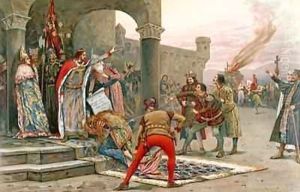Elek Benedek Paintings
Elek Benedek was a prominent Hungarian journalist, writer, and folklorist, born on September 30, 1859, in Kisbacon, then part of the Austro-Hungarian Empire (today Bața, Romania). He was a seminal figure in the Hungarian literary world of the late 19th and early 20th centuries, best known for his efforts in collecting and adapting Hungarian folk tales and legends for children and for his contributions to Hungarian journalism.
Benedek started his career as a teacher but soon moved into journalism, working for various newspapers and periodicals. His literary work was deeply influenced by the rich traditions of Hungarian folklore, and he dedicated much of his life to collecting, re-telling, and popularizing these stories. Benedek's collections of folk tales were among the first to make such stories accessible to a wide audience, and his adaptations were praised for preserving the original spirit of the tales while making them appealing to children.
Apart from his work with folk tales, Benedek was also a prolific writer of novels, essays, and travelogues. His writings often reflected his deep love for the Hungarian landscape and its people, as well as his commitment to social justice and national identity. Despite facing criticism from some contemporaries for his romanticized view of rural life, Benedek's work was instrumental in fostering a sense of national pride and cultural identity among Hungarians during a period of significant social and political change.
Elek Benedek's legacy is not only found in his literary contributions but also in his role in shaping Hungarian cultural identity and preserving its folk traditions. He passed away on August 17, 1929, in Târgu Secuiesc, Romania, but his work continues to be celebrated for its impact on Hungarian literature and folklore. His stories are still widely read in Hungary and have been translated into several languages, ensuring that Hungarian folk tales are known and loved around the world.
